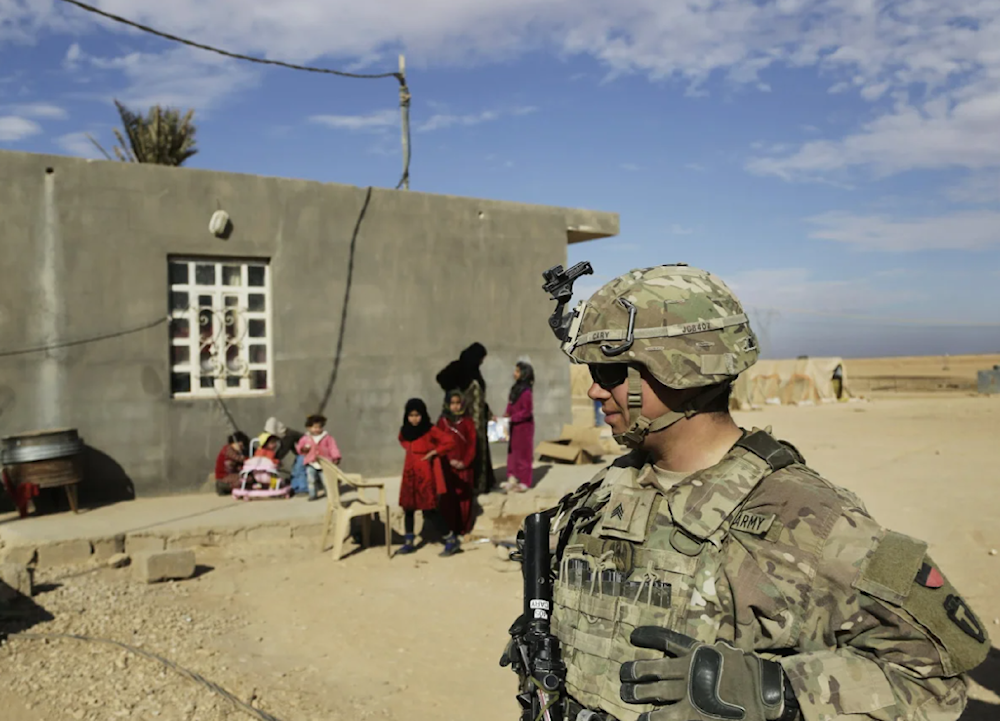Iraq, US agree to discuss timeline for withdrawal of US troops
The Iraqi Foreign Ministry says the timing would be dependent on assessing the "threat posed by IS and its danger," as well as the "reinforcement of the capacities of the Iraqi security forces."
-

US Army troops stand outside a home in al-Anbar in western Iraq on January 27, 2018. (AP)
Iraq's Foreign Ministry has reported that Baghdad and Washington have agreed to form a committee to begin discussions on a timeframe for the gradual departure of American soldiers from the nation.
The Ministry said in a statement published on Thursday that military officials will meet to discuss the future of the US-led military coalition in Iraq.
According to the statement, both countries agreed to create working committees to develop "a specific and clear timeline" that will allow the "gradual reduction of its (the coalition's) advisers on Iraqi soil," adding that the timeline will depend on the "threat posed by IS and its danger," as well as the "reinforcement of the capacities of the Iraqi security forces."
US Secretary of Defense Lloyd Austin also confirmed "working group meetings of the U.S.-Iraq Higher Military Commission (HMC) in the coming days."
Last week, Iraqi Prime Minister Mohammed Shia al-Sudani reiterated the call for the coalition's departure.
"The end of the US-led coalition mission is a necessity for the security and stability of Iraq. It is also a necessity for preserving constructive bilateral relations between Iraq and the coalition countries," Sudani stated during a televised event at the World Economic Forum in Davos, Switzerland.
The Iraqi Resistance's operations against the US forces have proven to be potent, with CNN reporting that the recent airstrikes launched by the US against local Resistance groups made the discussions more important.
It is noteworthy that the Resistance attacked US forces in Syria and Iraq in a bid to boot them out due to their support of the Israeli occupation in light of the ongoing genocide in Gaza.
As the United States violated Iraq's sovereignty on numerous occasions, but more recently in an attack on a PMF leader, calls from the Iraqi government for the withdrawal of US troops have amplified in response to these strikes.
Despite recent strikes and the wider regional instability, the Pentagon emphasized that the Iraqi government has not formally requested a US military withdrawal and claimed that US troops are still in Iraq at the invitation of the government.
Iraq's Foreign Minister hinted at the impending discussions, stating that he received an important message from the US government, to be studied by the Prime Minister and relevant authorities. No set deadline exists for the conclusion of the talks.
US unwelcome
A statement from the Iraqi parliament emphasized the irrevocable nature of the legislation adopted in January 2020, requiring the government to end the presence of all US-led foreign military forces in the Arab country.
The United States redeployed a large force in Iraq following an agreement with the Iraqi government which mandated the US military to support the country in its fight against ISIS. Under a Combined Joint Task Force, dubbed "Operation Inherent Resolve," the US has maintained a large presence, including two airbases, through which it claims to fight terrorism in the region.
Deputy Speaker Mohsen al-Mandalawi declared that the bill enjoys widespread popular support and urged the government to implement the legislation while focusing on bolstering Iraqi security forces rather than relying on foreign troops to combat terror groups.
Al-Sudani's statement echoes a similar one made last week, wherein he called for an agreement on a specific timeframe for the withdrawal of the US-led international coalition in Iraq which "honestly" needs to be "quick".
In an interview for Reuters, al-Sudani said, "Let's agree on a timeframe that is, honestly, quick, so that they don't remain long and the attacks keep happening."
Moreover, the Prime Minister explained that to avoid "more expansion of the arena of conflict in a sensitive region," the "devastating killing machine [in Gaza]" must be brought to an end and humanitarian aid must be delivered "as soon as possible."
Al-Sudani stressed that this "is the only solution".
"There is a need to reorganize this relationship so that it is not a target or justification for any party, internal or foreign, to tamper with stability in Iraq and the region," the Prime Minister said, emphasizing that Iraq can now defend itself against terrorism and should exercise its full sovereignty upon the entirety of its territory, thereby avoiding providing any pretext to drag Iraq into a regional conflict.
Additionally, al-Sudani explained that for Baghdad the US "is not an enemy" and that Baghdad is "not at war with it, but if these tensions continue it will definitely impact and create a gap in this relationship."

 5 Min Read
5 Min Read








